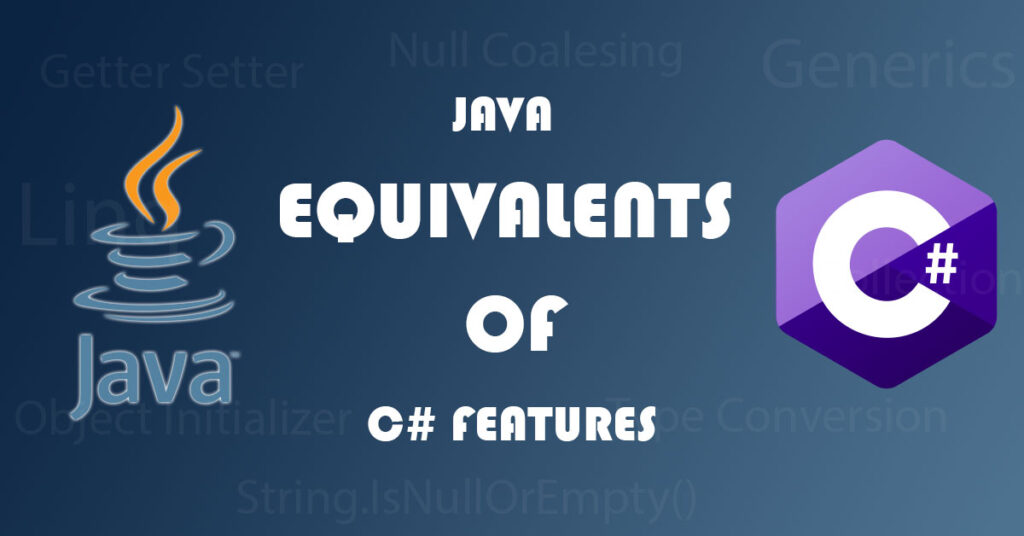I’ve been playing around with C# for more than 2 years. Recently got a chance to explore Java.
I didn’t have much idea of Java except that both are quite similar in construct. All I needed to find is the equivalents of C# features in Java.
This post covers the Java equivalent of some of the popular C# features, classes, or methods in brief. I’ll add more to this list in the future. If you feel any important feature is missing, feel free to add a comment.
I assume the reader has some basic to medium programming experience.
C# Linq
Java Equivalent for C# Linq is Streams introduced in Java 8.
Where()
C# Example:
List<User> filteredUsers = users.Where(u => u.Name == "Soundar")
.ToList();
Java Example:
List<User> filteredUsers = users.stream()
.filter(u -> u.Name == "Soundar")
.collect(Collectors.toList());
Skip(), Take()
C# Example
List<User> filteredUsers = users.Skip((page - 1) * pageSize)
.Take(pageSize)
.ToList();
Java Example
List<User> filteredUsers = users.stream()
.skip((page - 1) * pageSize)
.limit(pageSize)
.collect(Collectors.toList());
More examples on streams are here
Collections
List
C# Example
List<User> user = new List<User>();
Java Example
List<User> user = new ArrayList<User>(); // or new ArrayList<>():
More collection examples are here
String.IsNullOrEmpty()
C# Example
bool hasValue = String.IsNullOrEmpty("");
Java Example: isBlank() as of JDK11
// isBlank() as of JDK11 bool hasValue = (str == null) || str.isBlank(); // for before JDK11 bool hasValue = (str == null) || str.length() == 0;
Null Conditional or Optional Chaining Operator
C# Example
string userCountry = user?.Address?.Country;
Java Example
string user Country = (user != null && user.Address != null) ? user.Address.Country : "";
Null Coalescing
C# Example
int? x = null; //if x is null 0 is assigned else value of x is assigned int y= x ?? 0;
Java Example
int y = (x != null) ? x : 0;
@ – Verbatim Identifier
C# Example
//multiline text
string multiline = @"select * from users
where id = 1";
//escaping
string filePath = @"C:\Program Files\";
Java Example
//multiline
String s = "select * from users \n"
+ "where id = 1";
//escaping
string filePath = "C:\\Program Files\\";
$ – String interpolation
C# Example
int value1 = 1;
string example = $"We can use variables or values inside string { value1 }";
Java Example
String.format("name=%s email=%s", name, email);
Object Initializer
C# Example
User user = new User() {
Name = "Soundar",
Email = "example@gmail.com"
};
Java Example: In Java, there is no object initializer feature. We need to use the constructor or classic setter methods
User user = new User();
user.setName("Soundar");
user.setEmail("example@gmail.com");
Getter Setter
C# Example
class User
{
public string Name { get; set; }
}
Java Example
class User
{
private String name;
public String getName()
{
return this.name;
}
public void setName(String name)
{
this.name = name;
}
}
Generics
Java generics is quite similar to C#. For detailed example, check here.
C# Example:
//class
public class ExampleClass<T>
{
}
//method
public void Method<T>(T param)
{
}
Java Example:
//class
public class ExampleClass<T>
{
}
//method
public <T> void method(T param)
{
}
Type Conversion
C# Example:
//string to int
Int16.Parse("100"); //throws exception for invalid input
Int64.Parse("2147483649"); //throws exception for invalid input
int.Parse("30,000"); //throws exception for invalid input
Convert.ToInt16("100") //throws exception for invalid input
Convert.ToInt32("100") //throws exception for invalid input
Convert.ToInt64("100") //throws exception for invalid input
bool isValidNumber = Int32.TryParse("1000", out number); //no exception
// int to string
int num = 10;
string str = Convert.ToString(num);
string str1 = num.ToString();
Java Example:
//string to int
Integer.parseInt("200"); //throws exception for invalid input
Integer.valueOf("200"); //throws exception for invalid input
//int to string
String.valueOf(200);
Integer.toString(200)
For more on type conversions, refer this
I hope the above Java equivalents will be handy and help you get started in Java as a C# Developer.
Happy Coding 🙂
